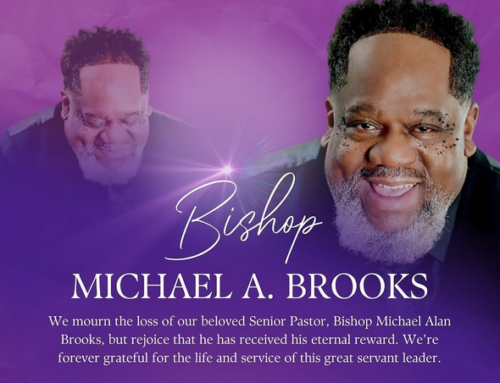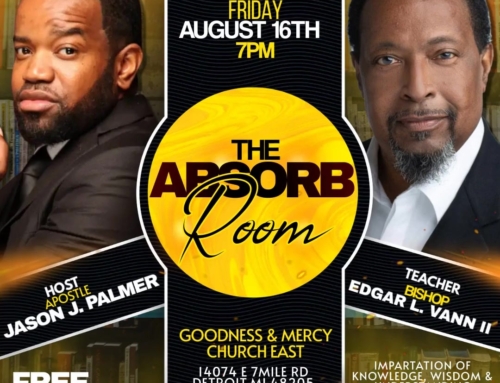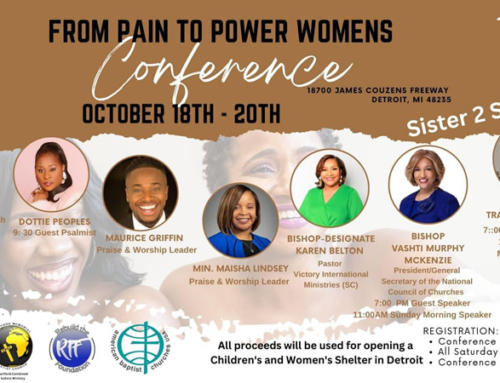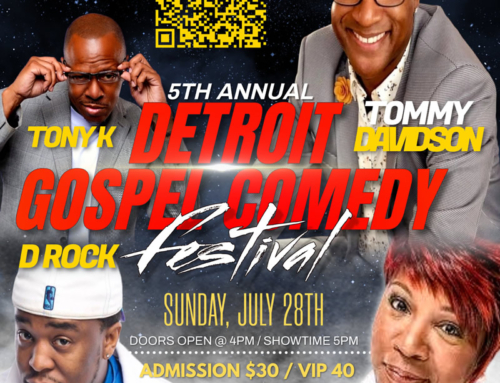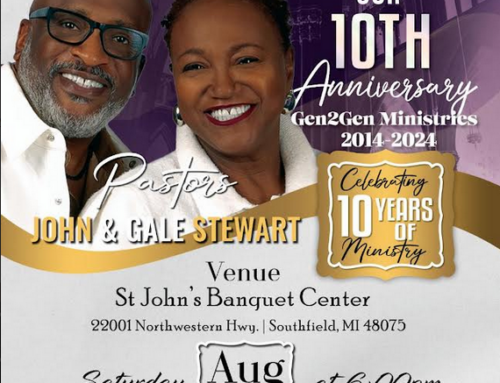
“One on One with the Ambassador” by Conway Norwood
My pastor regularly quotes those eternal words from II Corinthians chapter 5: “If anyone is in Christ, he is a new creation; the old has gone, the new has come!” That passage of scripture has always stood out to me personally because of what it goes on to proclaim: “God was reconciling the world to himself in Christ…and he has committed to us the message of reconciliation. We are therefore Christ’s ambassadors, as though God were making his appeal through us.” It was a remarkable way for the Apostle Paul to define new life and ministry for the believer, and it’s just how William Branch, a.k.a. the Ambassador (of Christian rap group Cross Movement), defines his ministry as a gospel rapper.

The Ambassador at the Hip Hop Holiday Harambee
The Ambassador ministered at the Hip Hop Holiday Harambee at Rosedale Baptist Church in Detroit on the last weekend of 2005. Prior to the concert, I had the privilege of joining him, Pastor Dennis Talbert, Pastor Haman Cross, and several of their colleagues at a luncheon where they discussed several challenges in holy hip-hop. As much displayed in his speaking as in his music, the Ambassador is an energetic, intelligent, and eloquent individual. He is a skilled lyricist with a sincere drive for evangelism through rap, and his unwavering passion for God and music link up to produce a vibrant ministry with intense potential.
On his Cross Movement Records release, The Thesis, the “Amba-ss-ador” brings it. With soul-bangers such as “Get You Open” and “The Anthem” and issue-conscious tracks such as “Body Talk” and “My Clothes, My Hair,” the Ambassador effectively deals with spiritual, social, and ecclesiastical matters while keeping your head bobbing and giving you a “reason to worship.” He cranks out his thesis “for all the hip hop heads,” proclaiming that Jesus Christ is “life for all the hip hop dead.” Even the album title fits him to a T; he’s a self-described “natural talker” with a penchant for linguistic detail linked arm-in-arm with a clear expression of Christian truth.

The Ambassador and Israel
When I sat down with the Ambassador, we discussed his artistry and ministry, but I was equally as interested in his perspective on the purpose and progress of holy hip-hop. He let me know that “hip hop, when properly submitted to the God of creation…is one of the great friends of the Christian faith and the missionary movement.” Simply put, his brand of hip hop is “bananas,” so “lift those hands up.”
Conway: How did you get started in hip-hop?
Ambassador: I saw rap as a platform for expressing the heart. I’m a natural talker. My father used to tell me, “Your tongue is your greatest asset, but it’s also your greatest liability.” The MC platform is perfect for somebody like me. Ever since ’88, I’ve been trying to put out an album.
C: You rap with Cross Movement. What do you have to offer that distinguishes you from your band mates and other rappers?
A: I’m a little more extroverted than everybody else, so it’s my passion to elaborate on whatever I’m talking about. Most cats aren’t as wordy as me. In this case, it’s articulating this principle of missions in hip-hop. That’s really my baby. Other cats believe the same thing, but they don’t want to do an album on it. In Christology, elaborating on the person of Christ and the work of Christ, [Cross Movement] holds to the same convictions, but they don’t necessarily make [missions in hip hop] their point of elaboration.
C: What challenges do you face as a holy hip-hop artist?
A: The interest of how it’s presented. I was involved in a fairly recent campaign called “From the Concert to the Classroom to the Corner,” and the idea is that it was never meant to stop at a bunch of concert-goers and CD buyers. Really, we got into it to do what our secular counterparts are doing. They’re leading people into an existence that for them is hip-hop oriented, street oriented, and a secular world-view. We wanted to use our rap to be presenters that people took seriously enough to say, “I want to adopt some of those things. You got the same clothes they got, you got the same this they got, you did what they did,” and hopefully, people would follow us as we followed Christ. The challenge is everyone wants the next new thing – the next thing to get you hype. The era of hip-hop is a crunk era. People really don’t want to be indoctrinated through any sober means. They want rowdy, buck-wild anthems and they want to chant basic principles, but we’re in an age [where people need] discipleship. When you think of discipleship, you use terms such as “sitting at the feet of Jesus” or “take My yoke upon you and learn of Me,” but secular hip-hop isn’t fostering that mindset.

C: Where do you think the gospel rap industry is now and where would you like to see it go?
A: There’s only a few people that move any real units. That’s relatively speaking. None of us move any real units on the mainstream scale, but there’s a few cats that move a few units, and everybody else a very small amount. Right now, gospel rap is an open avenue to produce almost anybody who wants to put out something. It’s so desolate and so small, and there’s a lot being pushed through a narrow tube. You have a variety of people who see this as an opportunity to say different things, and right now, I think that a lot of cats are starting to preach Jesus, but it has less to do with coming up with a creative way to say the stuff that makes the Christian audience buy it. I’m trying to see people lead with their life and their lips so that we get a chance to see how you’re implementing or how you gain what you’re rocking us with.
C: Do you think there’s an epidemic of people that are in the game, but aren’t necessarily living it?
A: Yeah, or even if they’re not living it, there are almost no avenues of access to see them live it beyond just their catchy way of presenting that they’re living it. That’s the failure of media and of a lot of [other] things: how can you demonstrate that this is your life and not just your craft?
C: How do you see gospel rap growing?
A: There’s a wider array of talent. There used to be a time when you thought that if it was Christian, it was going to be wack, but there’s tons of stuff out there that’s not wack stylistically. The question is whether or not it’s substantive. There’s a lot of stuff out there, and there’s less – but still a lot – that’s talented. There’s even less that’s substantive AND talented, and there’s less people that are actually living it in and out of season. In season, [some] cats are on point, but out of season, they fall off, but they put out some of the [hottest] stuff. Then you got the cats that really love this to pay off for them, so whether it’s lyrically or production-wise, you have the cats that facilitate the godless agendas that they’re calling everybody away from in their rhymes; they produce for cats that make their living off of the stuff that they’re telling us we shouldn’t do. I think that’s problematic when you start producing for the very people who are the icons of the stuff that you’re telling us God doesn’t want us to do.
C: How do you think you’ll be able to overcome the challenge of getting more media exposure?
A: I think God will have to do it. The normal route is always the breakthrough artist who makes other people realize that we can have our own 50 Cent’s. It’s always going to be that if it looks like it works, a whole bunch of people are going to try it. I think in time, it’s going to happen. It has powerful potential, and somebody is going to do it, it’s going to “work,” and somebody is going to imitate, and it’s going to work again, so I think it’s just a matter of time.

The Mad Prophets at the Hip Hop Holiday Harambee
For more on The Ambassador visit:



